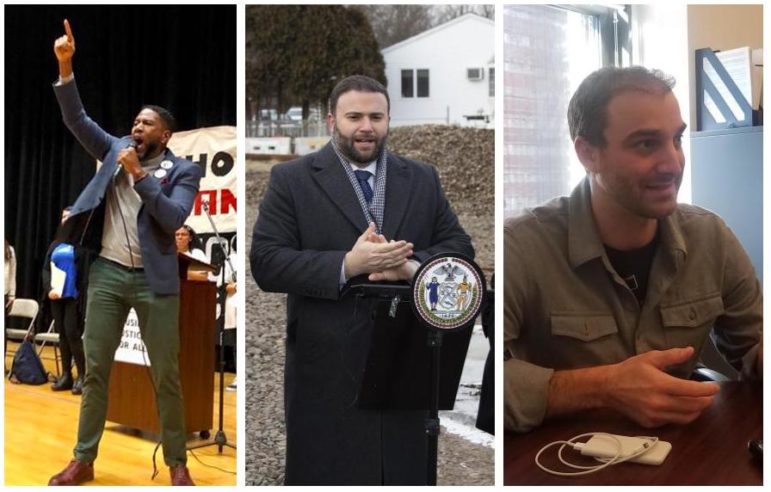
Office of the Public Advocate, William Alatriste for the NYC Council, Murphy
The candidates for public advocate, from left to right: Democratic incumbent Jumaane Williams, City Councilmember and Republican/Conservative nominee Joseph Borelli and Libertarian Devin Balkind.
For the first time, New York State residents will be able to vote early in person this election year, with special early-voting polling sites (find yours here) opening on Saturday.
It will not be the first time New York City residents vote for the office of public advocate. In fact it will be the second time this year and the third time in two years. After Letitia James was re-elected in 2017, Eric Schneiderman resigned as state attorney general in early 2018 amid a sexual misconduct scandal, and James won last year’s Democratic primary and general election to succeed him. A special election in February drew 17 candidates and saw Jumaane Williams win with just over a third of the vote.
Now, Williams is running again, hoping to win the right to serve out the remainder of what would have been James’ second term, which ends on New Year’s Eve 2021. He’s opposed by Staten Island City Councilmember Joseph Borelli on the Republican and Conservative lines and by Libertarian Devin Balkind, who also ran for the post in 2017 and netted under 7,000 of the 1.2 million votes cast.
The five ballot questions involving charter revision proposals are also on the ballot, as are district attorney contests in three boroughs (only the Queens race is contested), judicial posts and an election in Williams’ former Council district, where Farah Louis is hoping to confirm her hold on an office she won in the February special election and defended in a June primary. Early voting runs October 26 through November 3, and Election Day is November 5. A complete list of contests is here.
Interestingly, three of the ballot questions would increase the strength of the public advocate, given the city’s No. 2 official–who has investigative powers, can introduce City Council legislation and becomes interim leader of the city if the mayor vacates office. One question would permit the advocate to make an appointment to the Civilian Complaint Review Board, another to name someone to the Conflicts of Interest Board and a third to create a guaranteed budget for the advocate’s office.
The office is derided by some as a needless appendage and a stepping stone (both Bill de Blasio and James used the post to springboard to higher office, and Mark Green tried to do the same).
In interviews with the Max & Murphy Show–temporarily operating as a podcast while WBAI’s local staff and volunteers battle for control of the station–the three candidates running for the seat provided different rationales for how to use the office. The common thread was that each saw potential for the office to make a difference, if changes were made.
Borelli called the job “a useless position that the city should weigh removing if they don’t improve it to a degree that makes it worth something to the taxpayers.” But that “if” is important. Borelli said the advocate’s relevance would increase if it were given control of the Department of Investigation (DOI).
That way, “the commissioner of DOI will be accountable to an independent elected official,” Borelli said. “There are 51 constitutions in the U.S.A and almost all of them, except the federal constitution, put the chief law enforcement officer of a state as a separate elected position from the chief executive of the state. Our city should do the same thing.” He noted, however: “Anything I’m taking about in terms of reforming the office can’t even be done by the public advocate. The best I could do is cut the budget down by cutting the staff down. But, beyond that it will take a referenda or state law.”
Balkind said he saw the post as, “The gateway to information about how the city works, what’s working in the city, what’s not working in the city, and how it can be improved from a person who isn’t tied to a political party, and has a vested interest in everything looking great.” He sees a particular need to streamline access to the city’s massive network of social-service providers through what he calls a 211 system.
“Almost every county in America, 90-plus percent of counties, has a 211 system. If you call 211 on your phone, you are connected to a call-center operator who has in front of them a directory to all nonprofit social services that are available in that community, and they can give you a referral about whatever service you need, he said. “The fact that we don’t have that is a travesty.”
Williams, meanwhile, indicated that the changes he is making to the structure of the office are still taking root. He hailed the increase in the office’s budget for this year. “One of the biggest things we’ve done is begin to restructure the office like we said we would,” he said. Noting that man staff members left with James, “I think we’re at about 90, 95 percent now which is exciting.”
“We’ve changed he office, very much so. We have five deputy public advocates that are based on issue areas from housing to education. We’re just getting ready to hire borough advocates and other community organizers. So we’re very excited about what’s about to happen here,” Williams said.
Listen below for more on how the three candidates view the job and the city. (Also, a programming note: Williams and Borelli debate Tuesday evening at 7 on NY1.)
With reporting by Xavier Means.








